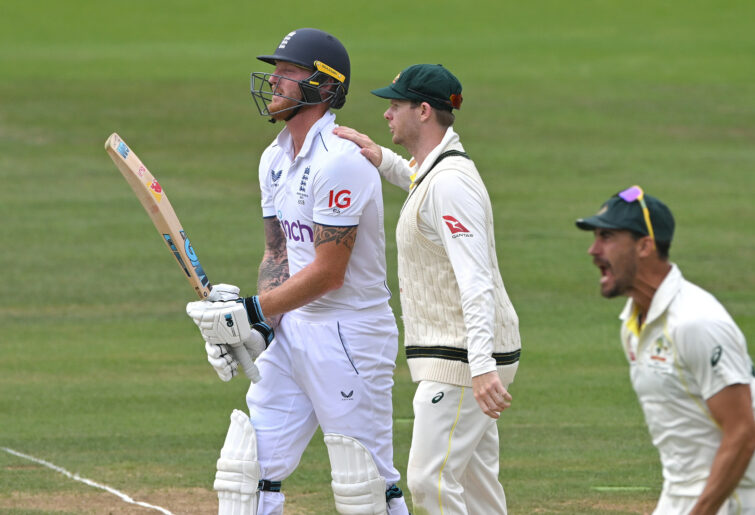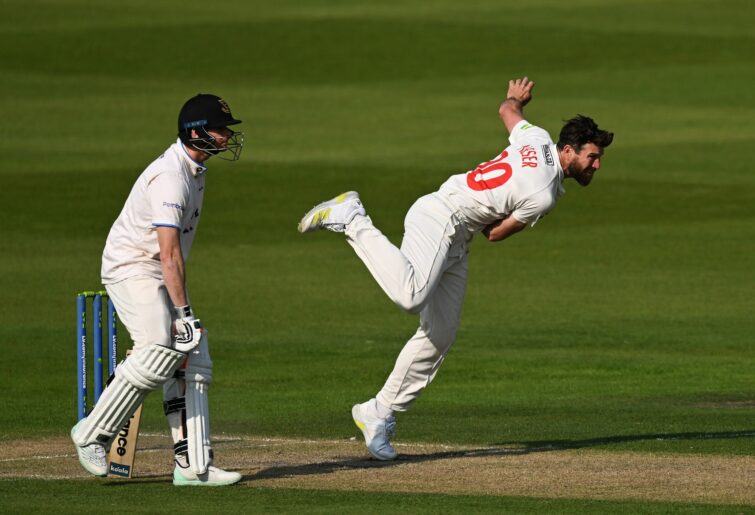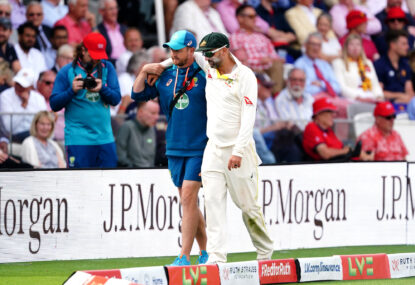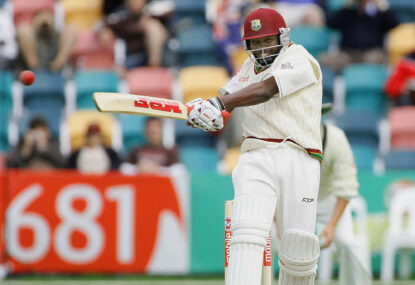Mitch Marsh’s explosive and spellbinding 118 (off 118) on day 1 of the third Ashes Test not only validated the long overdue return to Test cricket for one of Australia’s most deserving and hard-working exiles, but also serves to demonstrate the contrasting attitudes each team has brought to this pinnacle of Test cricket.
Only a day has passed since Marsh became the fastest Aussie to hit a century in the Ashes since Victor Trumper did it in 95 balls back in 1902. Since then, much has been written about Marsh, with a number of writers highlighting Australia’s continuing “good-problem-to-have” selection puzzles.
As a long-suffering Marsh fan and sometimes-apologist, I nevertheless choose to echo his own comments in response: “It’s probably a touch early for (talk)” of whether he should retain his spot in the team.
But it is that talk which serves as the foundation for a dramatic contrast to England’s attitude to this latest Ashes campaign.
Selection in an era of Bazball
Consider that, in the lead-up to the series, all that could really be heard was hype around the pending contest between differing styles of cricket, Australia’s disciplined versus England’s “Bazball” – a catchall term to describe big-hitting and aggressive tactics … I think.
England’s focus on the near-messianic properties of Bazball for the game of cricket necessarily dictated the team’s selection process. Rushed back from a catastrophic golfing injury, Jonny Bairstow was selected as keeper on the back of his pre-injury batting prowess – a selection decision which has cost England dearly.
Similarly, instead of trusting to the future of England cricket, a one-word text message brought retired off-spinner Moeen Ali back into the team, very likely because he can be trusted to hold up one end of the wicket while also boasting an impressive batting record. And, courageously, England captain Ben Stokes is battling through any number of niggles and injuries.

Ben Stokes is consoled by Steve Smith after being dismissed for 155 runs. (Photo by Stu Forster/Getty Images)
Opening England’s batting is Zak Crawley, an odd choice considering that he averages less than 30 and has passed 50 runs only six times in the last 20 matches (16 innings) – including his devastatingly impressive 267 against Pakistan in 2020.
The commonality? An ability to bat ferociously and “play their own game” – or so was often explained by the team since Stokes took the captaincy and New Zealand’s Brendon McCullum took the reins as coach.
Even England’s bowling attack seems predicated on fulfilling their role as attack dogs instead of their ability to beat the recently confirmed No.1 Test cricketing nation.
A team made up of tempestuous batters, often out of form, numerous injuries and niggles, and a bowling attack focused more on talk and attitude (until, thankfully, the selection of Chris Woakes and Mark Wood).
Selecting an Australian team
What is the contrast, then? And how does Mitch Marsh exemplify this contrast?
Consider Australia’s team not only as opponents, but as a contrast to England’s team: the XI selected not because of their ability to all play the same, but because of their differing styles and their attitude to the team; a willingness to trust to the next generation; and readiness and opportunity to rest injuries.
The preferred 11 starts with an ageing opening pair consisting of a bull and a panther. The world’s No.1, 2, and 3 best Test batters in at 3, 4, and 5 – two identical batting obsessives and a free-flowing strokemaker.
A 25-year-old all-rounder who is actively ‘managed’ by his captain to preserve his long-term ability to play for Australia, and rested at the first sign of strain. A wicket-keeper at the top of his game who had to step into the team to replace the outgoing and disgraced captain.
Australia’s bowling attack similarly highlights a contrast, with seven bowlers vying for four spots – one of which is the captain and, therefore, at minimal risk of being dropped or rested. And yet, despite the lack of positions available, each bowler is almost disbelievingly supportive of the others being picked above them.
But consider in particular the words of Mitchell Marsh, selected in the extended squad for the sole purpose of potentially stepping in to replace the team’s single all-rounder.
“My previous experience on long Test tours is you always get a chance at some stage,” he told reporters. “I just wanted to stay ready and [I] think I’m the first man to score a Test hundred on a UK holiday.
“I wouldn’t mind going back to my UK holiday to be honest. Greeny can come back in. But we’ll see what happens.”
Marsh once confessed he believed that, “Yeah, most of Australia hate me.” This, despite the fact that his teammates unreservedly describe him as the “ultimate team man” and praise his role in the extended squad as indispensable. Moreover, Marsh has worked hard to secure himself as among the first men selected for Australia’s white-ball games.
This is the contrast that Australia’s men’s Test team demonstrates against their rivals.
Contrasts
A lot of the focus in recent days has been Australia’s supposed butchering of the “spirit of the game”. While it takes only a moment to demonstrate the fallacy of this claim – former England cricketer and current commentator Mark Butcher said during play on day 1, “You’re not entitled to wander off while the ball is in play” – the differing style in selection serves to further demonstrate this lie.
Australia has turned up to fight for these Ashes with a team in love with one another, ready to drop everything for their mates.
Nathan Lyon unapologetically risked further injury to an already injured calf just so the team could eke out an extra 15 runs.
Australia’s fast bowlers have arrived knowing that they probably won’t each play every game in the series.
Michael Neser, another long-suffering exile from the Australian team, similarly waits patiently for his opportunity to push into the squad, a hugely successful and demonstrative English County season behind him, while nevertheless heralded as another consummate team man.

Michael Neser bowls for Glamorgan as Steve Smith looks on for Sussex. (Photo by Mike Hewitt/Getty Images)
Conversely, what do we know about the England team? While the Australians do their best to keep their mouths shut, at least two of the English team have taken to their regular newspaper columns to further showcase Australia’s flaws, and others in the team have issued their own condemnations in interviews.
Similarly, as if a messaging memo circulated through the England team (not to mention 10 Downing Street), multiple players (and the UK’s Prime Minister) have disingenuously claimed that they ‘wouldn’t want to win a game in that manner’ – which is good, as Australia won the game by getting 20 wickets and scoring more runs, not just making one controversial but legitimate stumping.
Even one of England’s most garrulous former players, Kevin Pietersen, is getting sick of England’s attitude.
“If you’re going to talk the talk, you have to walk the walk, and this England cricket team isn’t walking the walk,” Pietersen wrote in a column (do they all have columns?).
“They’re acting like they’re the greatest team around, but they’re currently on course to be the first England team to lose at home to Australia since 2001.”
The spirit of cricket is important – I would hope most people can agree on that. But the spirit of cricket is not simply a rhetorical cudgel you pull out whenever something happens within the rules of the game that you dislike.
Rather, the spirit of cricket is, quite literally, the spirit – the attitude and manner in which you show up, from the beginning of the series, through every match, to the end – with which a cricketer carries themselves throughout the whole.
England turned up to these 2023 Ashes under the assumption they would single-handedly reshape how cricket is played. Instead, they are down 0-2 in the series and faltering on day 2 of the third Test, making more noise with their complaints, and performing poorly in the field.
Australia knew it was going to be a tough and competitive series, and that the boisterous home crowds would be less than pleased with them.
Instead of trying to beat Bazball or quiet the crowds, however, Australia has turned up to play the best cricket they can, with the best team available to them, and a genuine and demonstrative love for one another.
One need only look to the Australian balcony to witness Australia’s utter joy at Mitchell Marsh’s returning Test century for a dramatic contrast to the cricket being played (and talked) by England.





































































































